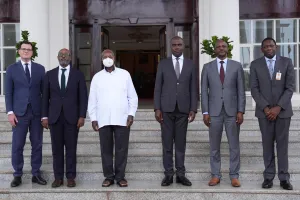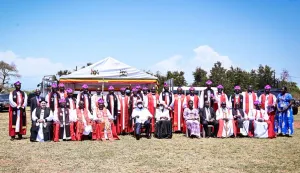
The Governor of the Bank of Uganda, Michael Atingi-Ego, has called for a rapid yet carefully structured regulatory framework for virtual assets, cautioning that without deliberate action, Uganda risks falling behind regional peers like Kenya.
Speaking at the Kampala Blockchain Summit 2025 at Four Points by Sheraton, Atingi-Ego described the moment as “pivotal” for shaping the nation’s digital finance future.
In his keynote address, he argued that the question for Uganda is no longer whether blockchain and cryptocurrency technologies are relevant. Instead, the real challenge is whether the country will be an architect of their adoption or merely a user of systems designed elsewhere.
“We meet at a moment when the decisions we make today will shape the structure, the safety, and the competitiveness of our economy for decades to come,” he said, urging stakeholders to act with intelligence and strategic focus.
Atingi-Ego acknowledged that Uganda’s cautious stance toward cryptocurrencies and blockchain has sometimes been misinterpreted as resistance. He clarified that regulators have prioritized citizen protection while carefully reviewing global best practices.
“Our stance has not been one of obstruction, but of protection. What is conservative about protecting millions of citizens from products they may not fully understand?” he asked, adding that Uganda must accelerate its digital finance capabilities to avoid remaining in what he described as the “financial stone age.”
The Governor highlighted that 84.5 percent of virtual asset activity in Uganda occurs on decentralized platforms, a rate significantly above the Sub-Saharan African average. He warned that this creates supervisory blind spots, leaving consumers vulnerable to fraud. While stablecoins are commonly used for remittances, he noted that they carry substantial macroeconomic risks.
Looking at regional developments, Atingi-Ego pointed to Kenya’s recent regulatory strides as a model. Kenya has begun licensing its first virtual asset service providers, whereas Uganda has yet to establish a formal framework. However, he framed Kenya’s progress as a learning opportunity rather than a threat.
“Being second to legislate does not mean accepting second-tier status,” he said.
Atingi-Ego outlined the core pillars that should underpin Uganda’s virtual asset legislation: licensing standards, client asset protection, anti-money laundering compliance, cybersecurity, market integrity, and transparency. He stressed that these are practical necessities, not theoretical ideas, for safely integrating virtual assets into national financial systems.
He also urged innovators to engage with existing regulatory sandboxes under the Bank of Uganda and the Capital Markets Authority, describing them as essential spaces for learning prior to formal legislation.
The Governor issued a direct challenge to stakeholders: the industry should engage constructively, build trustworthy businesses, and share expertise; regulators must build capacity, avoid reflexive rule-making, and coordinate to ensure regulation is proportionate, rigorous, and evidence-based; and consumers should exercise caution, avoid schemes promising guaranteed returns, and invest only what they can afford to lose.
Focusing on Uganda’s ambition to become a regional hub for virtual assets, Atingi-Ego asked: how can the country attract firms to Kampala when Nairobi is already ahead? He argued that Uganda must distinguish itself through high-quality legislation, world-class supervision, and a deep ecosystem of talent and infrastructure.
“Uganda does not need to follow. Uganda is ready to lead but only if we move with urgency and quality simultaneously,” he said.
Atingi-Ego concluded by emphasizing the long-term impact of current decisions on Uganda’s digital economy.













Chrispus Mutaahi
Leave a Comment
Your email address will not be published.